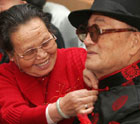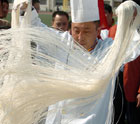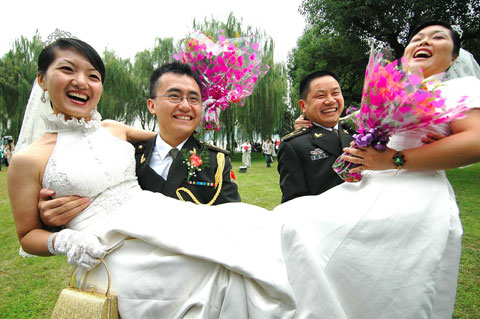The Communist Party of China (CPC) takes Marxism-Leninism, Mao Zedong Thought, Deng Xiaoping Theory and the important thought of Three Represents as its guide to action and theoretical bases.
Marxism-Leninism reveals the universal laws governing the development of history of human society. It analyzes the contradictions inherent in the capitalist system that it is incapable of resolving internally and shows that socialist society will inevitably replace capitalist society and ultimately develop into communist society.
Karl Marx and Friedrich Engels cofounded the theory of the proletarian political party, in which they expounded the basic tenets of the Marxist theory of party building and laid the theoretical basis for building the proletarian party. This constitutes the first monument of the Marxist theory of party building.
In his practical work of leading the socialist revolution and construction in Russia, Lenin both adhered to the basic tenets of the Marxist theory of party building and creatively solved a series of new problems arising in the building of the proletarian party. His foremost achievement was the creation of a preliminary theory for the building of the proletarian party in office, which constitutes the second monument of the Marxist theory of party building.
The Chinese Communists have untiringly striven to integrate Marxism with the concrete practice in China and adapted it to Chinese conditions.
Combining Marxism-Leninism with the concrete practice of the Chinese revolution, the first generation of the CPC's central collective leadership, with Comrade Mao Zedong as its core, settled such basic questions as the nature, motive force and object of the new-democratic revolution and the road to socialism in China. And Mao Zedong Thought was thus established, which is Marxism-Leninism applied and developed in China.
Mao Zedong Thought consists of theoretical principles concerning the revolution and construction in China, which have been proved correct by practice, and the lessons of experience learned therein; and it constitutes the crystallized, collective wisdom of the CPC.
On the basis of the Marxist-Leninist theory of party building and China's specific conditions, Mao Zedong established the theory for building a proletarian party in a semi-colonial, semi-feudal society constituted mainly of peasants and petty bourgeoisie.
The most outstanding contributions Mao Zedong made to the Marxist theory of party building are: First, he placed great emphasis on the purpose of building the Party, which is to serve the people wholeheartedly; and second, he attached great importance to improving the Party's style of work and insisted that the Party be built ideologically first. Mao Zedong's theory of party building is the first historic leap of the Marxist theory of party building in China.
After the Third Plenary Session of the Eleventh CPC Central Committee in 1978, the Chinese Communists, with Comrade Deng Xiaoping as their chief representative, reviewed their experience, both positive and negative, since the founding of the People's Republic.
They emancipated their minds, sought truth from facts, shifted the focus of the work of the whole Party onto economic development and carried out reform and opening to the outside world; this ushered in a new era of development in the socialist cause. They gradually formulated the line, principles and policies concerning building socialism with Chinese characteristics and clarified the basic issues regarding establishing, consolidating and developing socialism in China, thereby creating Deng Xiaoping Theory.
This theory is the outcome of integrating the basic tenets of Marxism-Leninism with the practical conditions in present-day China and the characteristics of the times; it is a continuation and development of Mao Zedong Thought under new historical conditions.
Deng Xiaoping Theory provides the preliminary answer to the question of great theoretical and practical importance: What is socialism and how can we build it? Deng Xiaoping's theory of how to build a party in office in the new era constitutes a complete and scientific system. His chief contribution to the Marxist theory of party building is that he defined the objective of Party building under the conditions of reform and opening up: "to build our Party into a militant Marxist party and a powerful central force that leads all the people in the country in building socialist material and spiritual civilization." Under the direct guidance of Deng Xiaoping's theory of party building, the CPC made impressive achievements in the new era in leading all the people in the country in wholeheartedly carrying out the socialist modernization drive. History has shown that Deng Xiaoping's theory of party building is the second historic leap of the Marxist theory of party building in China.
Since the Fourth Plenary Session of the Thirteenth CPC Central Committee in 1989, the third generation of the central collective leadership, with Comrade Jiang Zemin as its core, has held high the great banner of Deng Xiaoping Theory, stayed on the road of socialism with Chinese characteristics and unswervingly concentrated on economic development.
China's economic strength and national defense capabilities and the cohesion of the Chinese nation have increased continuously, and impressive achievements have been made in all fields of endeavor.
On the basis of the basic Marxist theory of party building, Comrade Jiang Zemin set forth the new theory of party building that calls for the CPC to always represent the development trend of China's advanced productive forces, the orientation of China's advanced culture and the fundamental interests of the overwhelming majority of the Chinese people.
In addition, he elevated this theory to the position of being the foundation of the Party, the cornerstone for its governance and the source of its strength. At its Sixteenth National Congress in November 2002, the Party established the important thought of Three Represents, together with Marxism-Leninism, Mao Zedong Thought and Deng Xiaoping Theory, as the long-term guiding ideology that it must uphold.
That was a historic decision. This thought carries forward the basic principles of scientific socialism in an all-round way and upholds the lofty ideal of communism, and its ultimate values and goals are entirely consistent with Marxism-Leninism, Mao Zedong Thought and Deng Xiaoping Theory.
The Three Represents adheres to dialectical materialism and historical materialism, embodies Marxism's theoretical characteristic of advancing with the times and is imbued with the same spirit as the Marxist stand, viewpoint and methodology. This thought of Three Represents constitutes an integral whole that comprehensively reflects the Party's basic theory, line and program. This thought enriches and develops the basic tenets of Marxism with a series of new ideas, views and theses and profoundly embodies the integration of history with reality in the development of the theory of Marxism.
The important thought of Three Represents takes the theory of building the party in office as its main subject, promoting economic, political, and cultural advancement under socialism with Chinese characteristics and all-round social progress as its basic content, and the great rejuvenation of the Chinese nation as its goal. To a great extent, it systematically answers these questions of our times: What kind of a party should we build and how can we build it? This thought reveals the laws concerning governance by the Communist Party, building socialism and developing human society, and it constitutes a new theoretical basis that guides all our undertakings toward success. At its Sixteenth National Congress, the Party established the important thought of Three Represents as the long-term guiding ideology that it must uphold. This shows that the CPC has become more mature in its theorizing, more attentive in its practice and more successful in its undertakings. The important thought of Three Represents has ushered in a new stage in the adaptation of Marxism to Chinese conditions.











